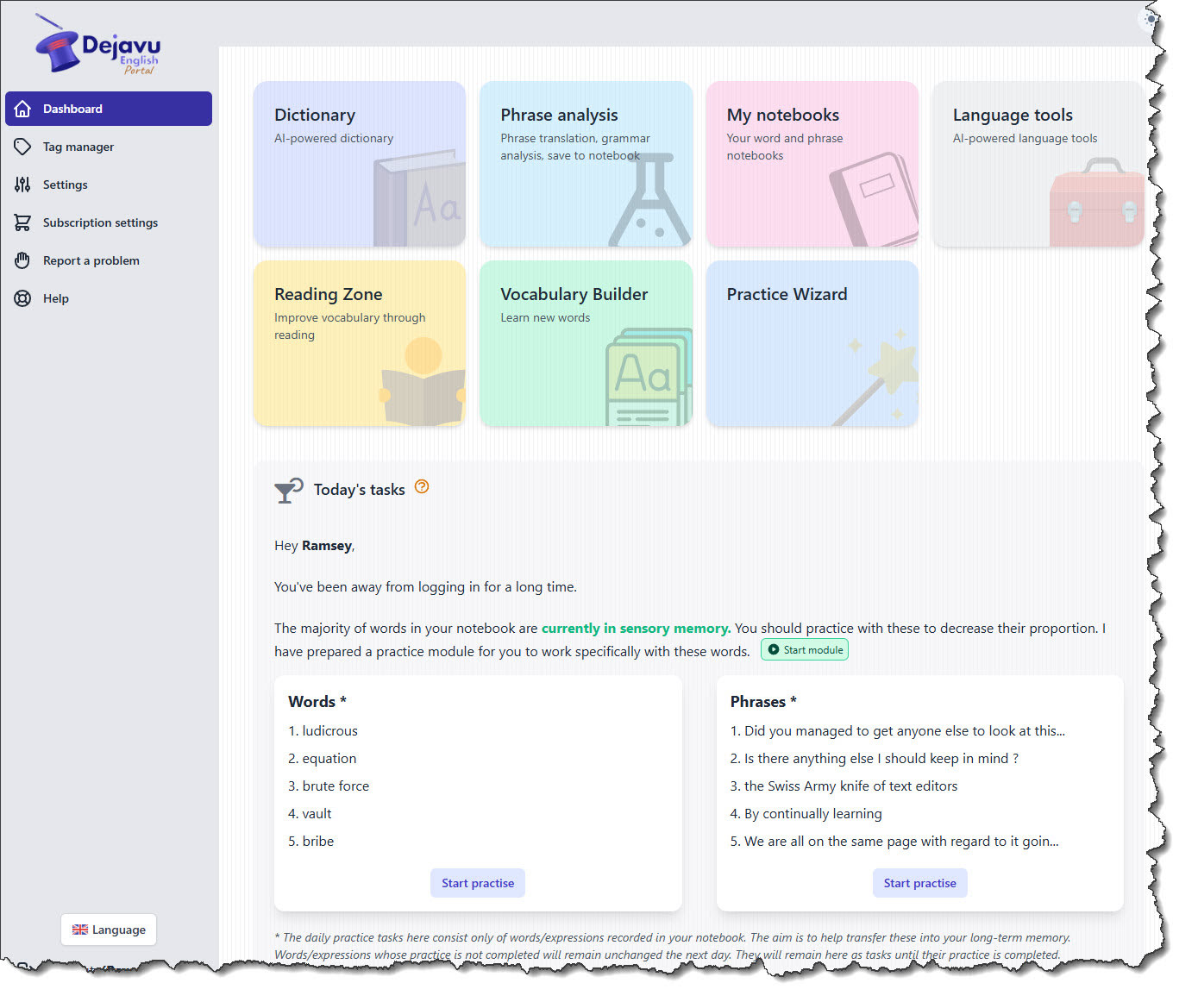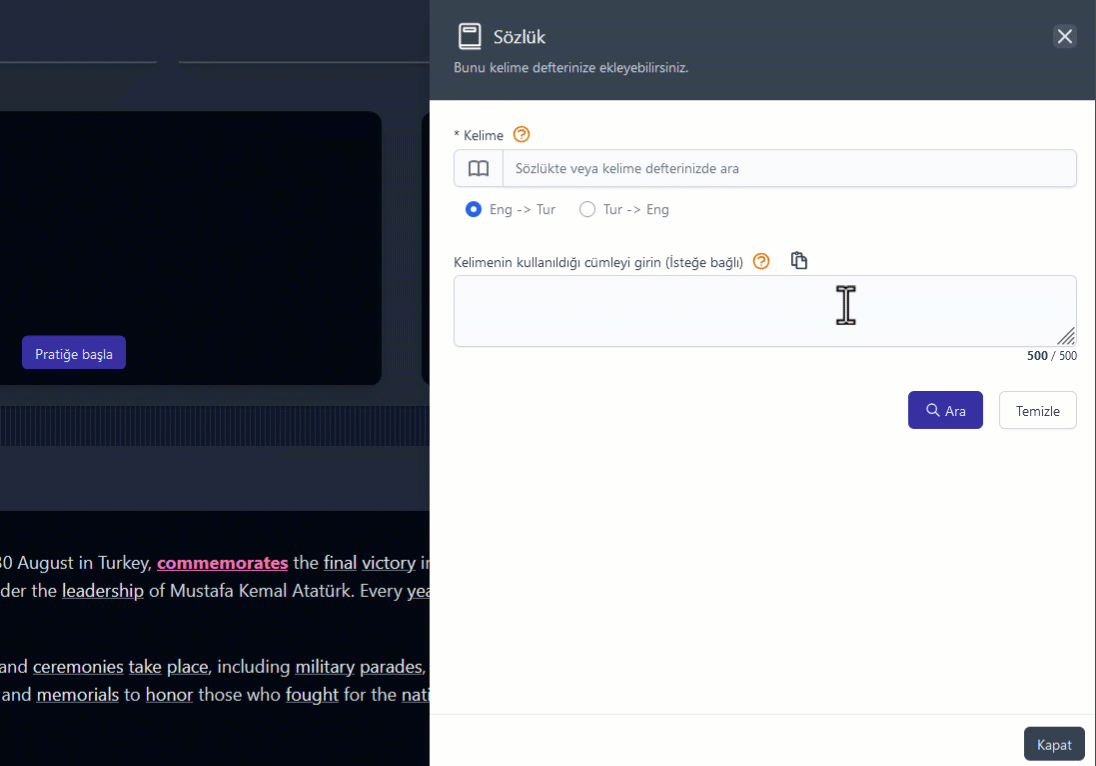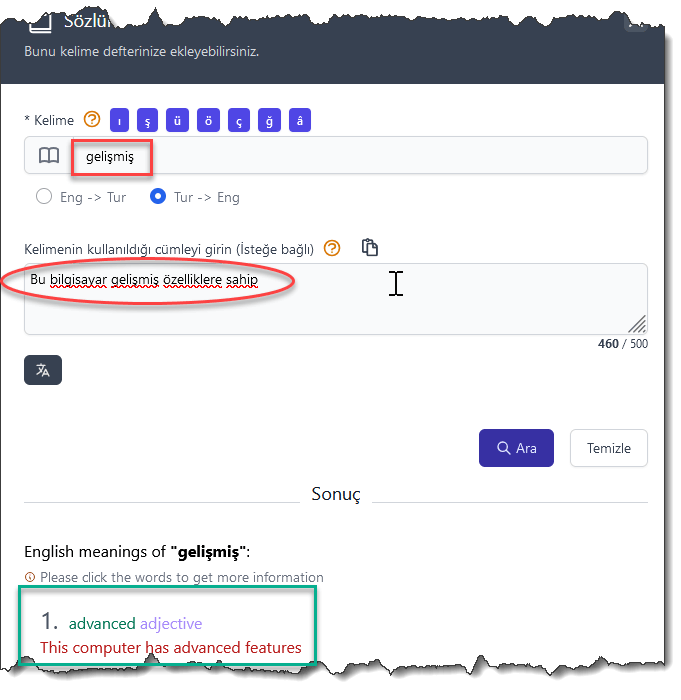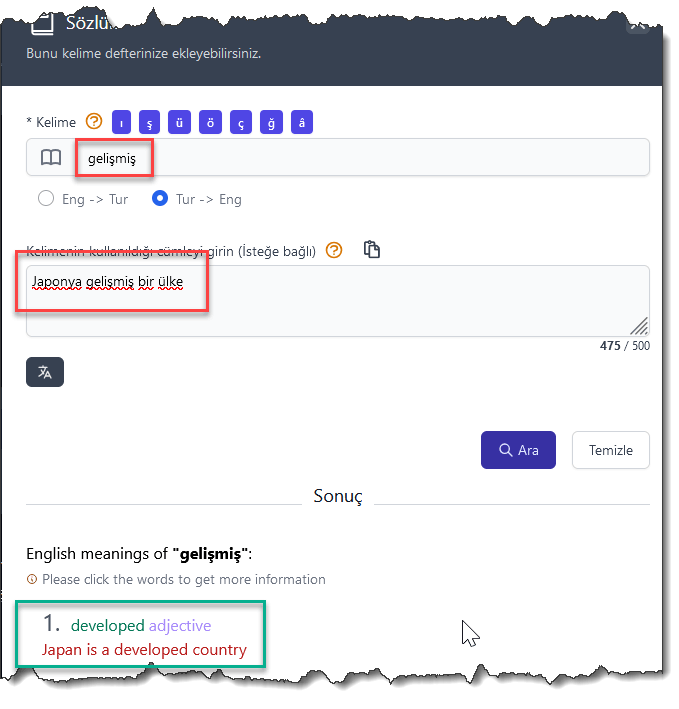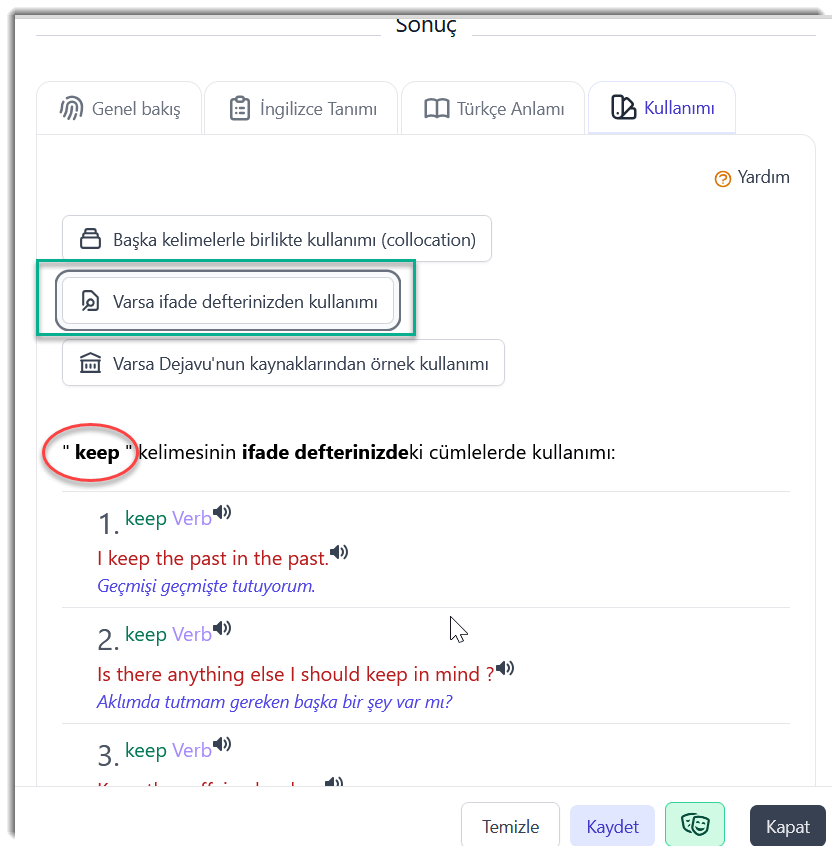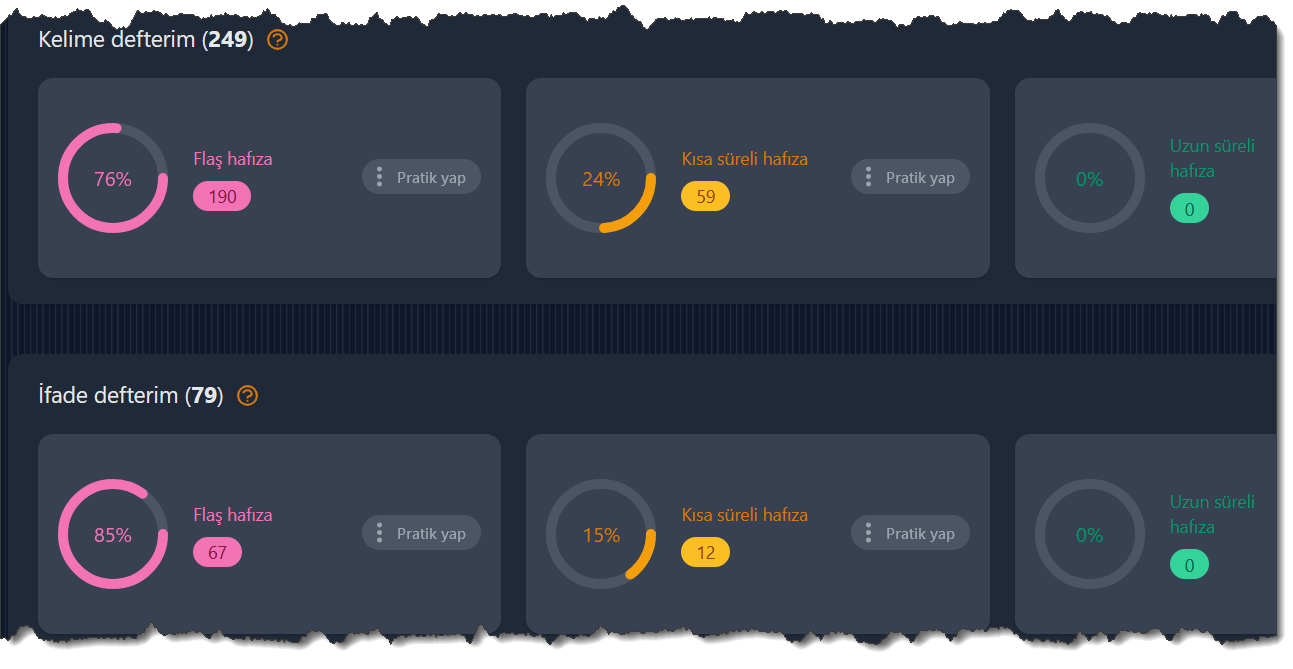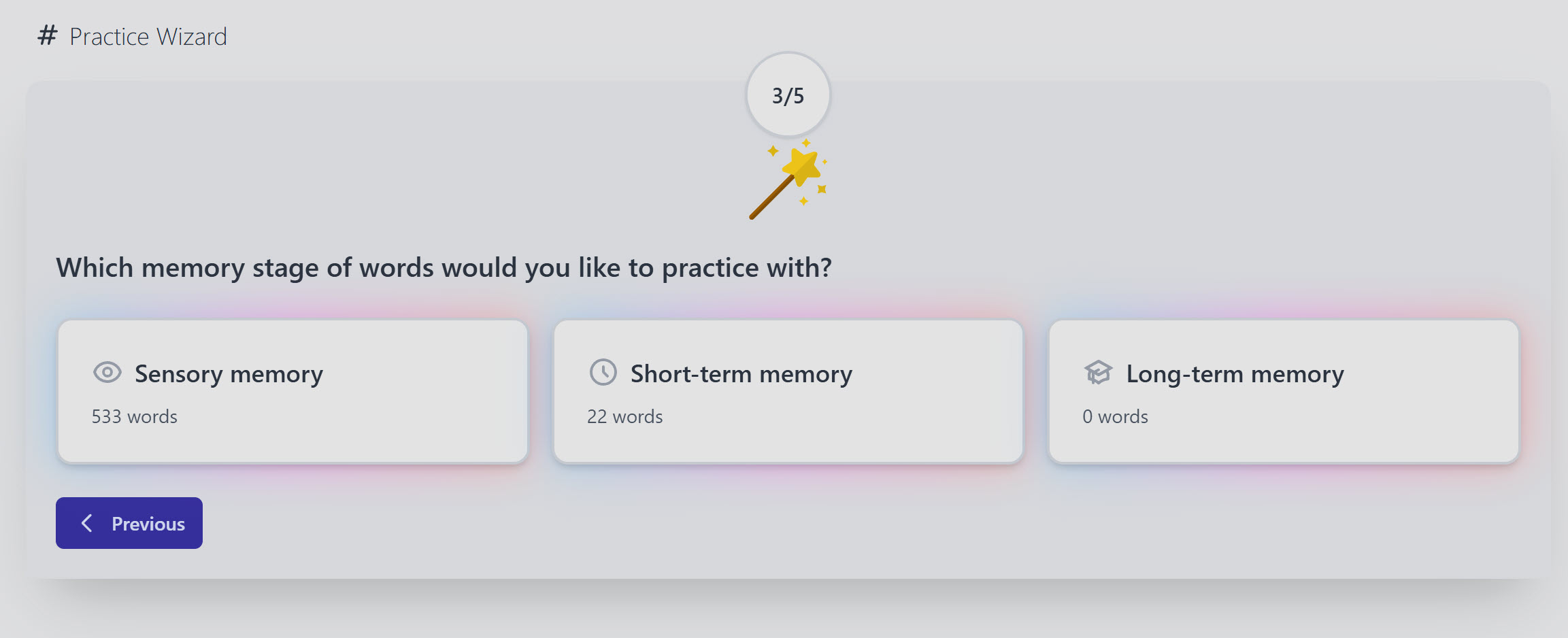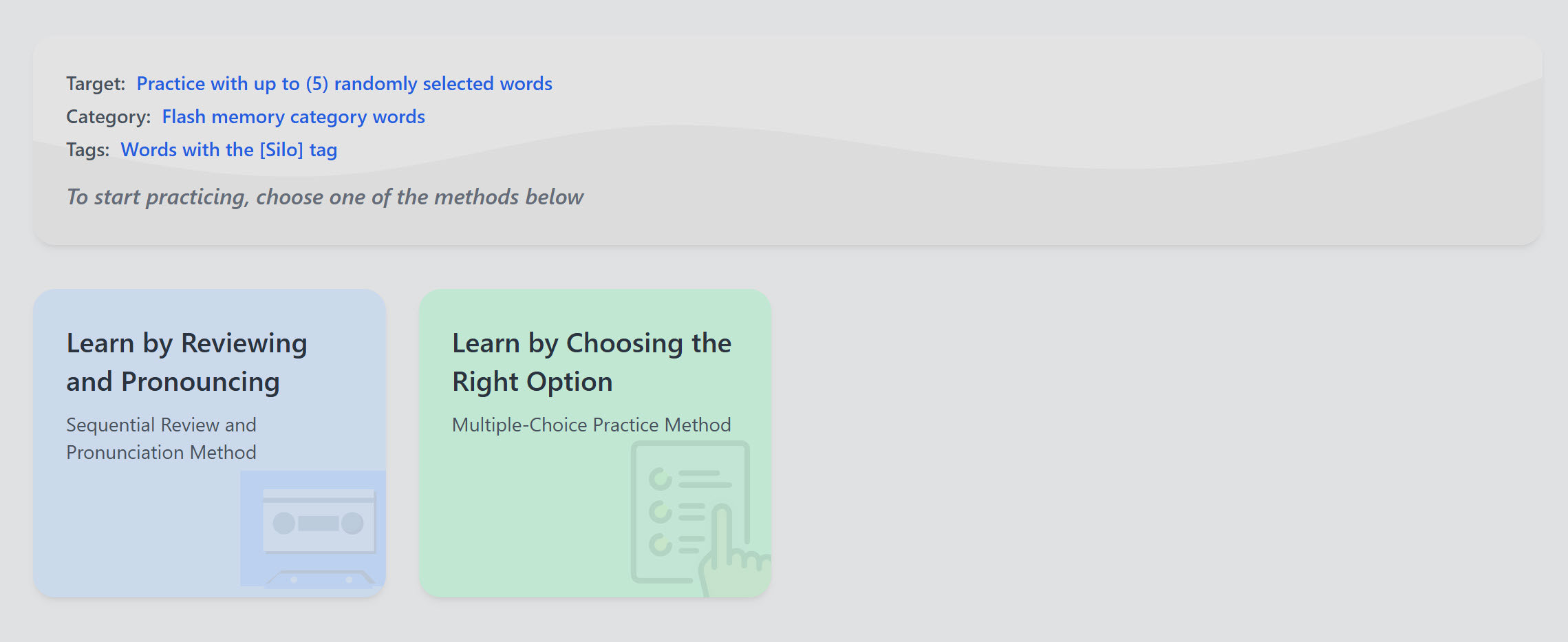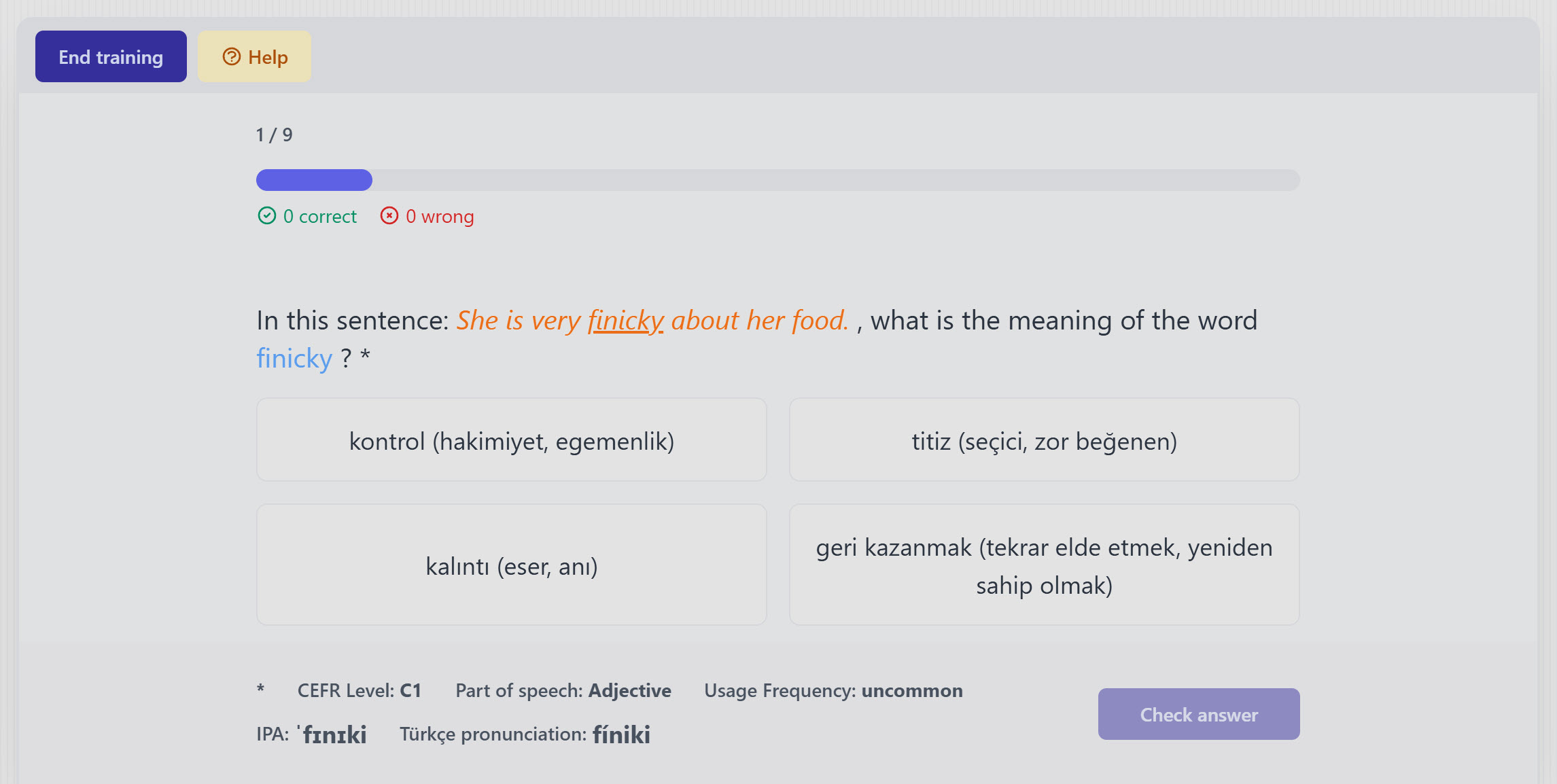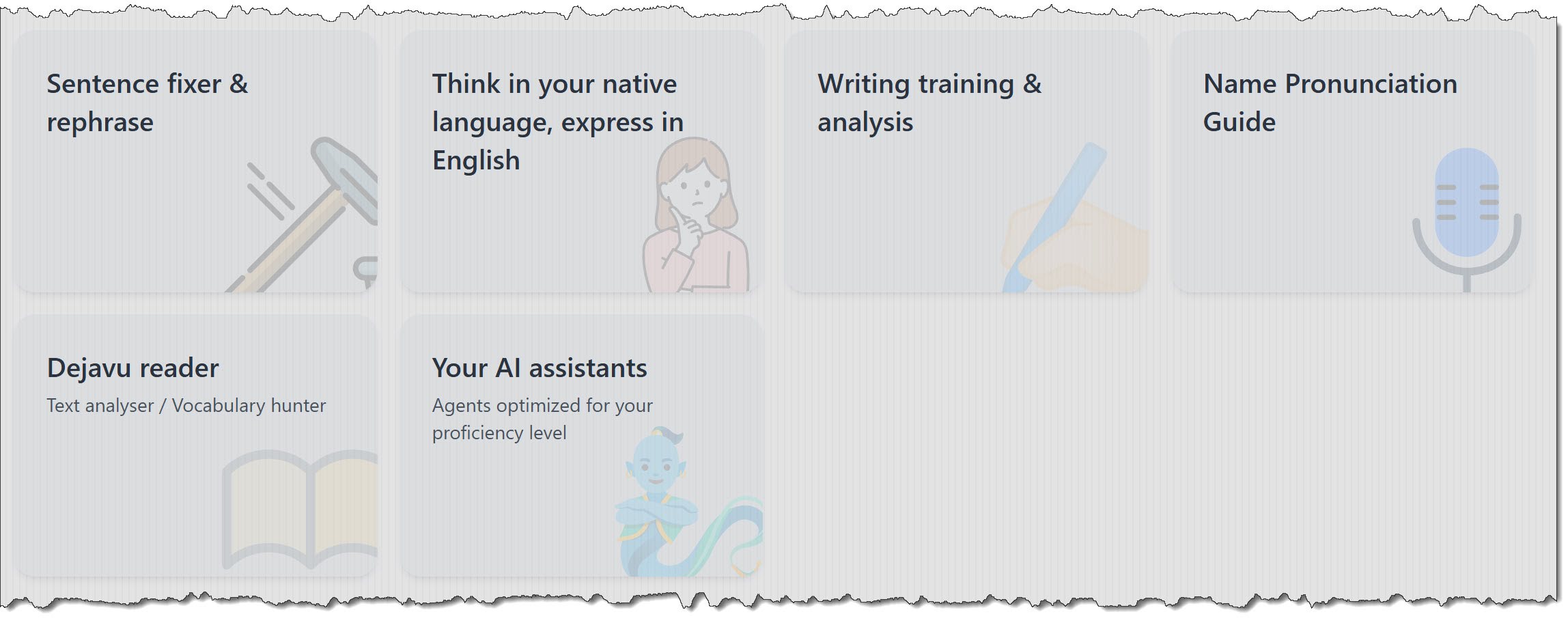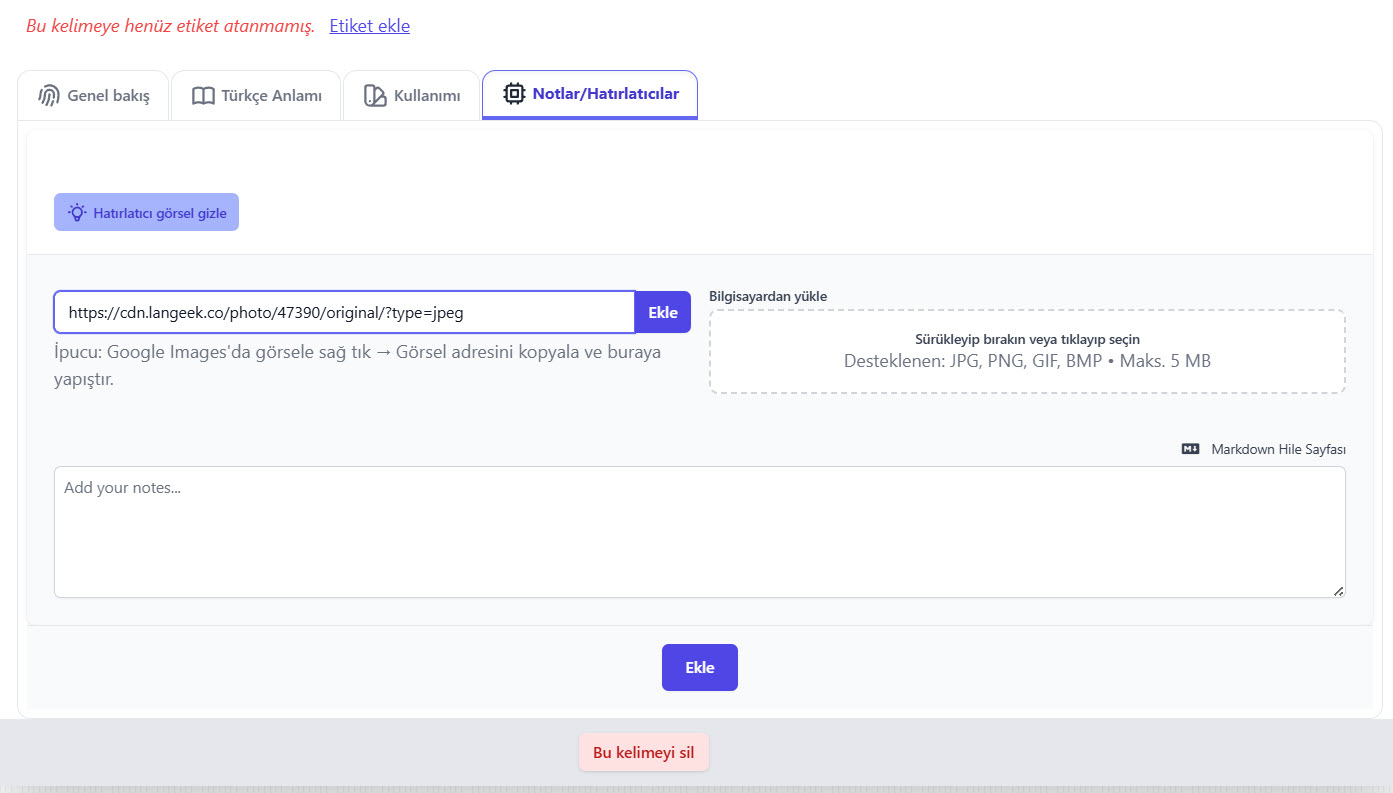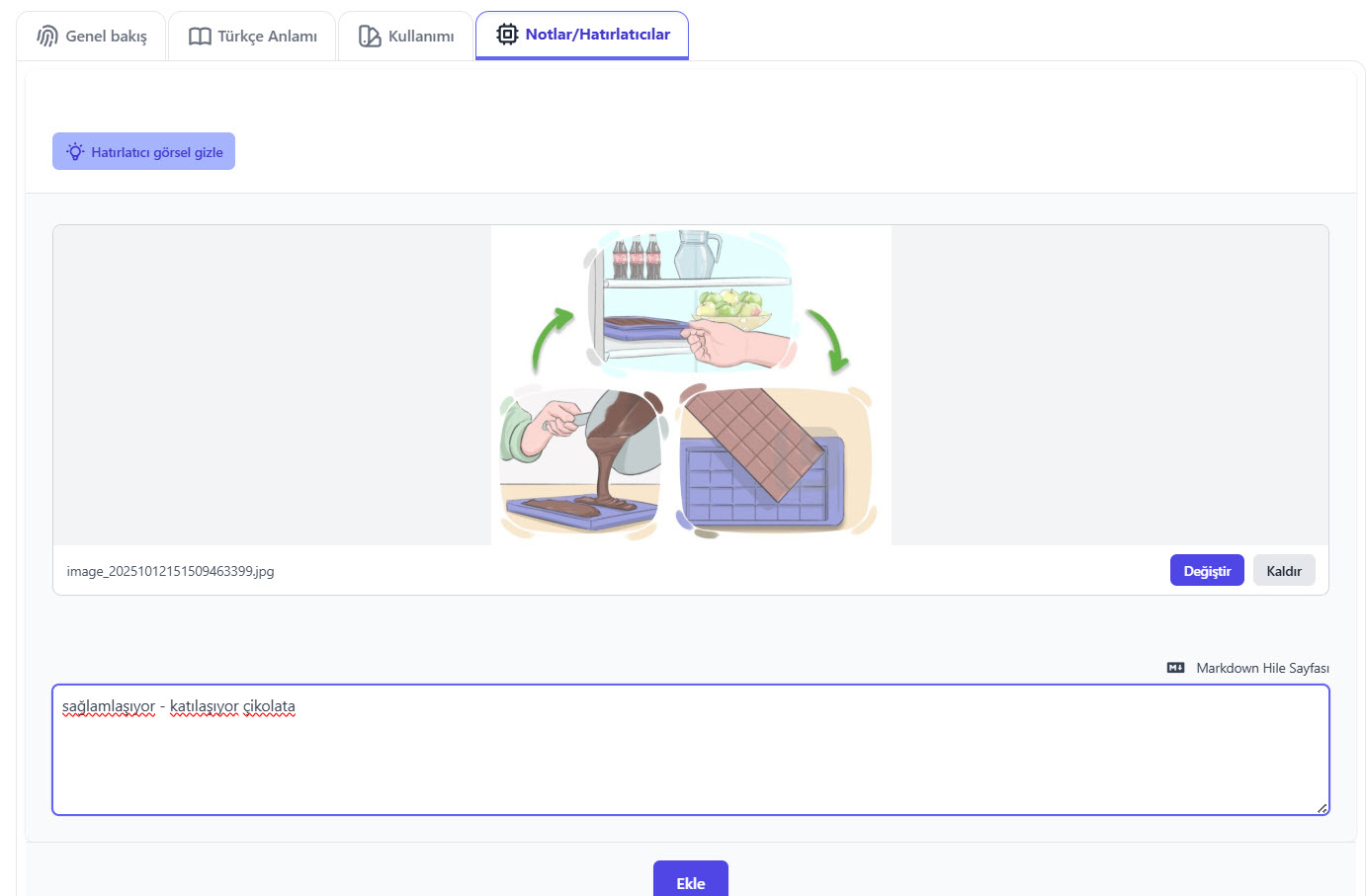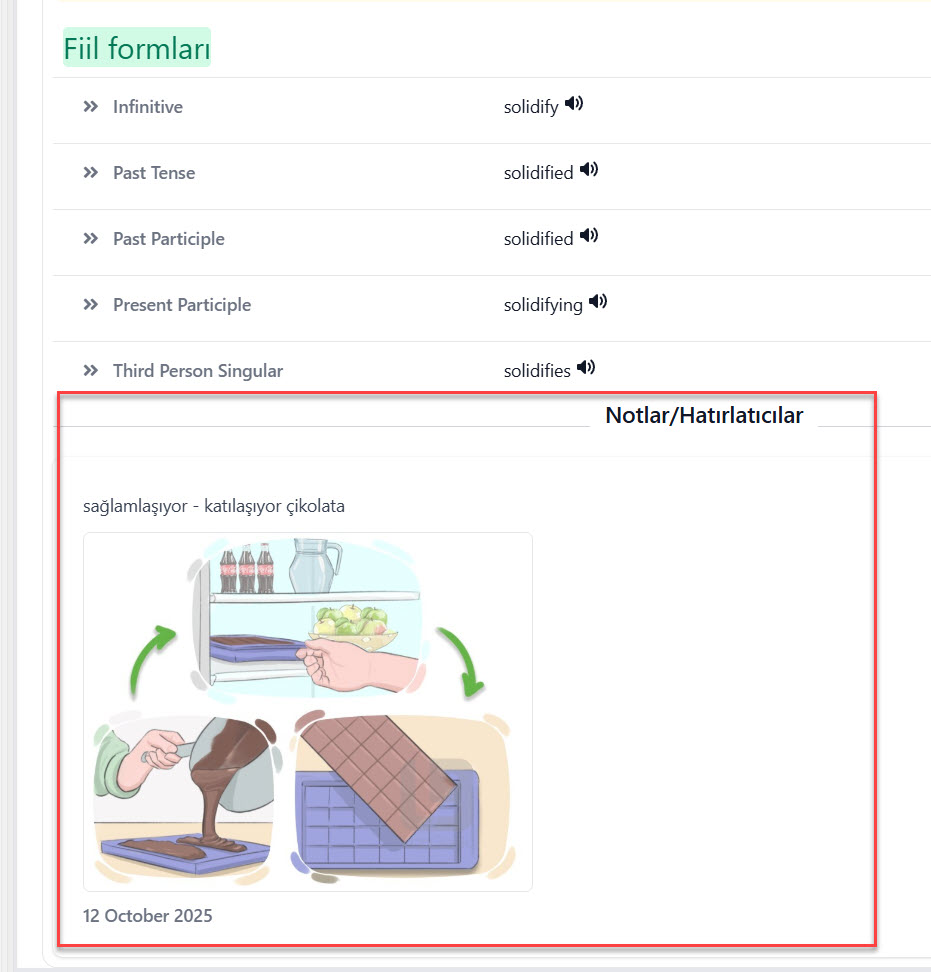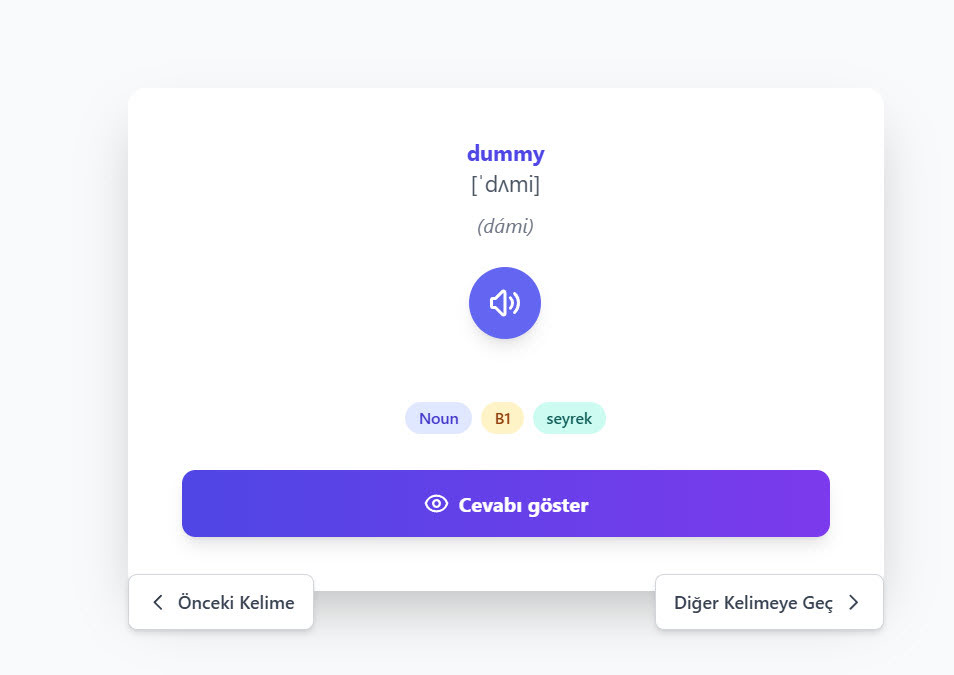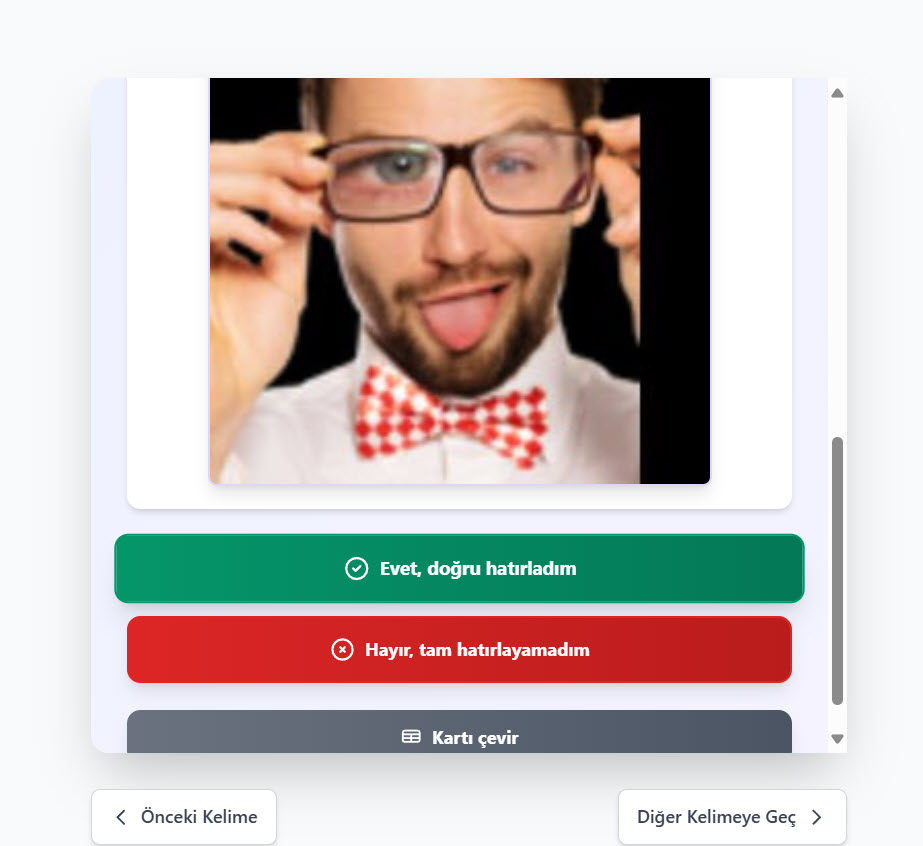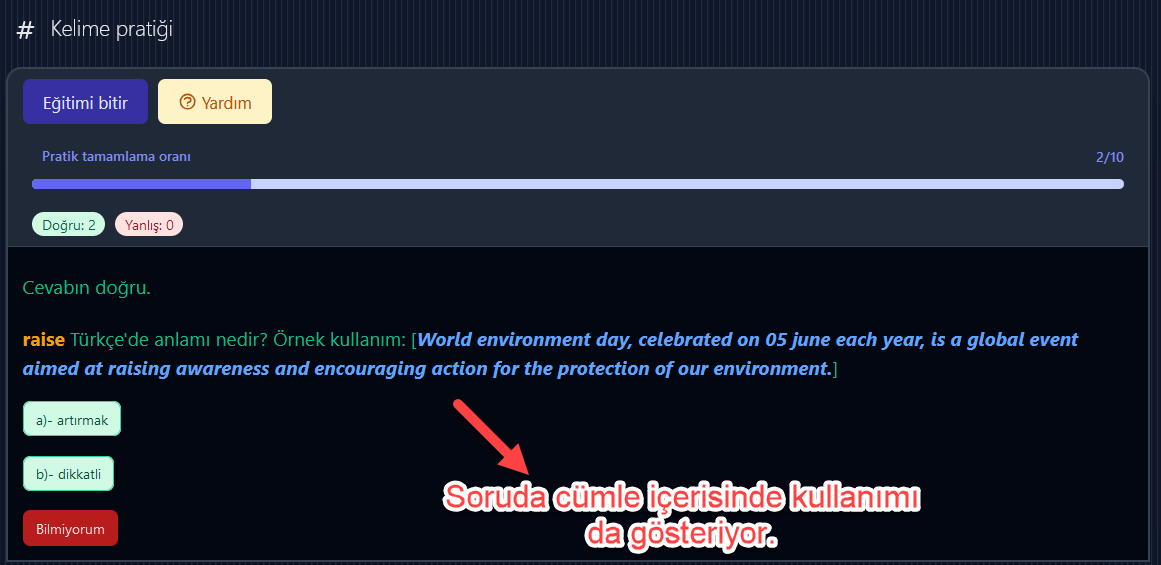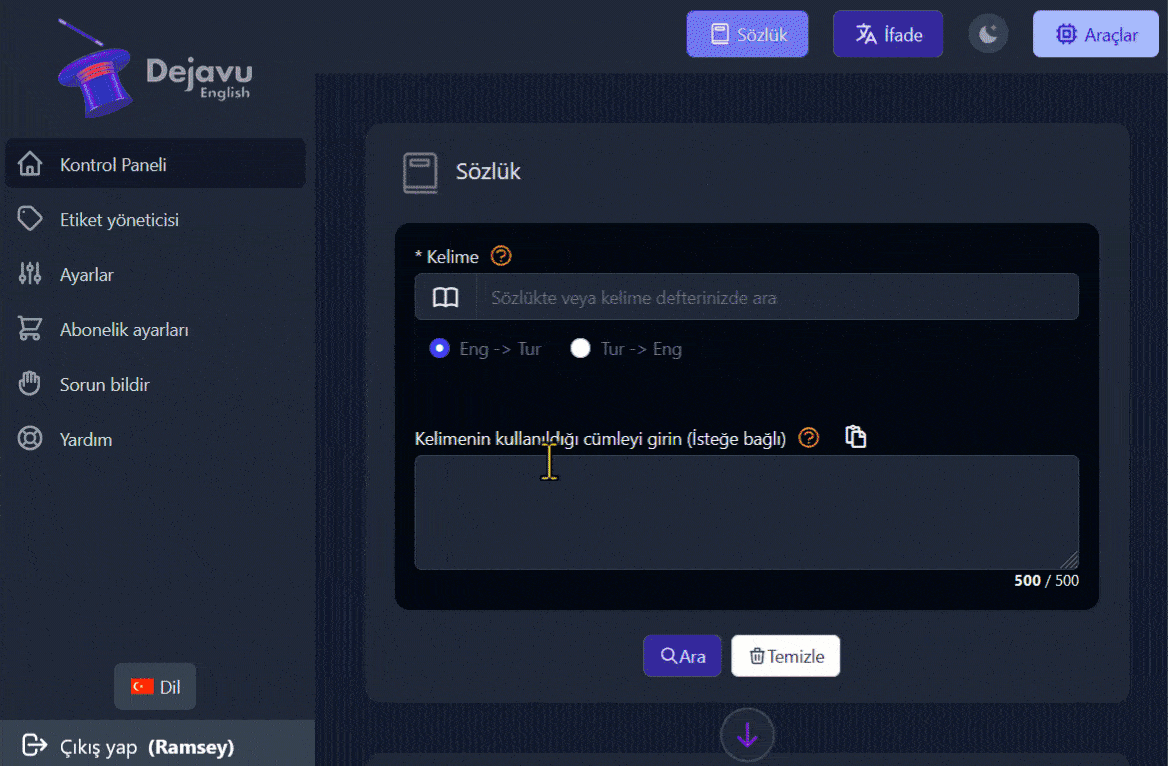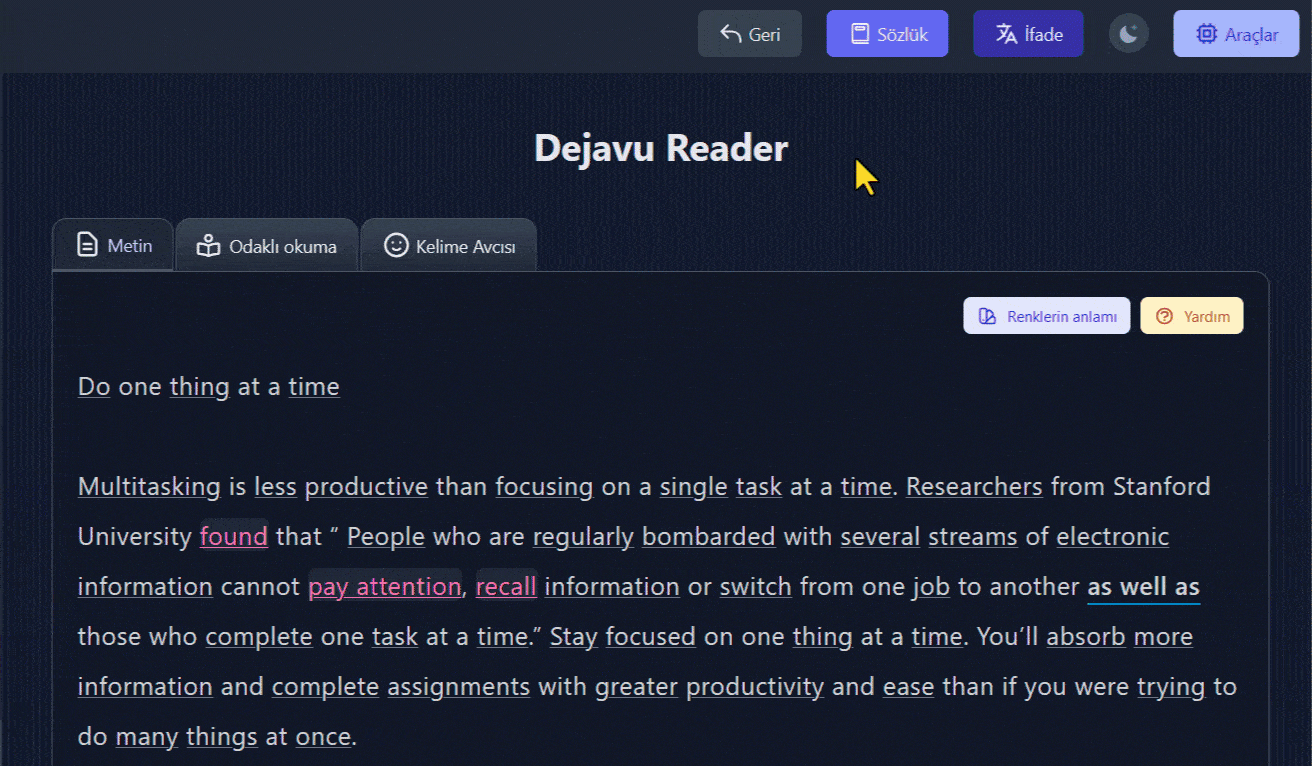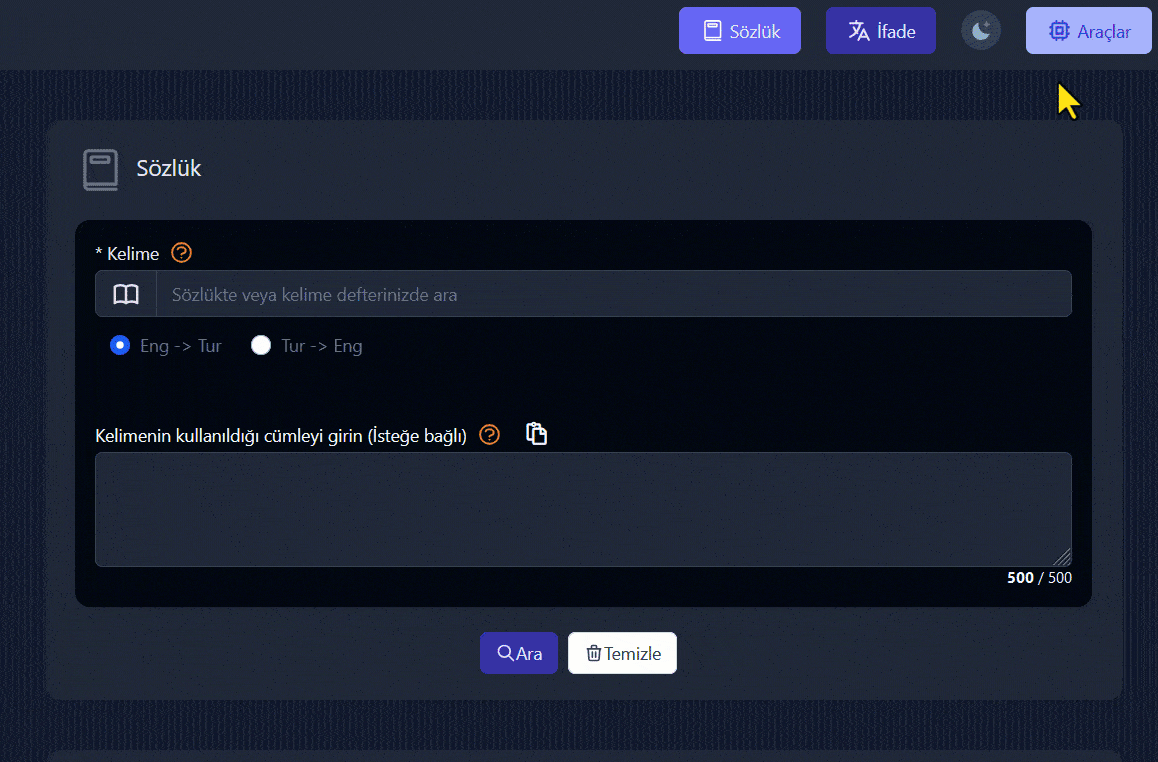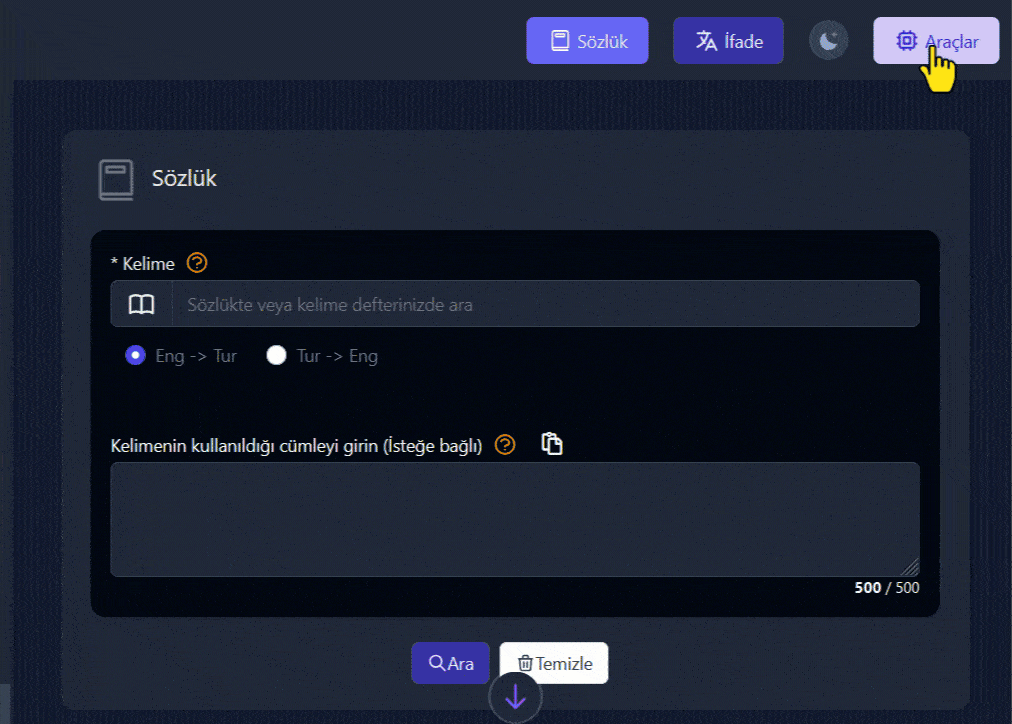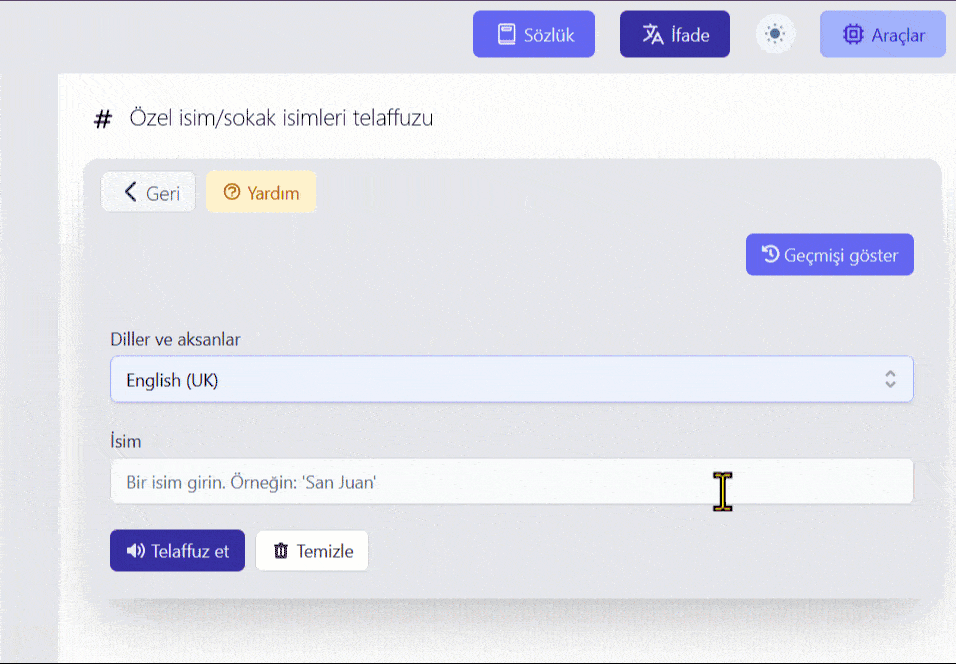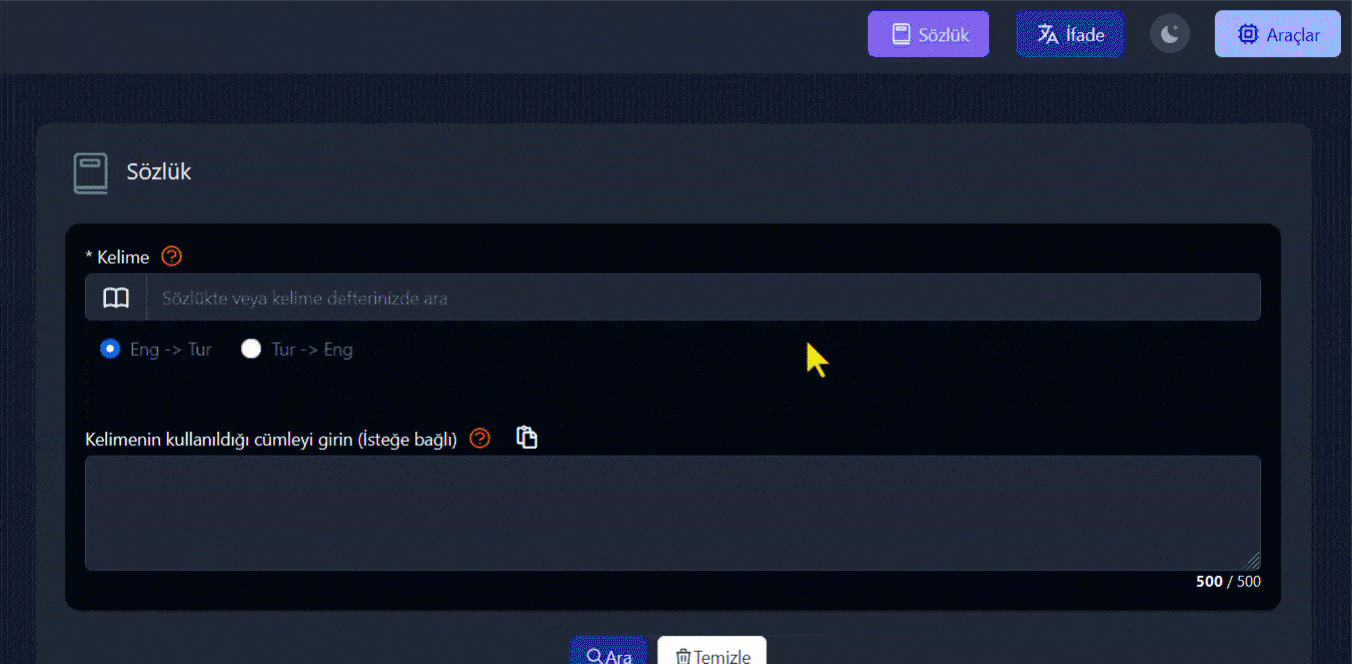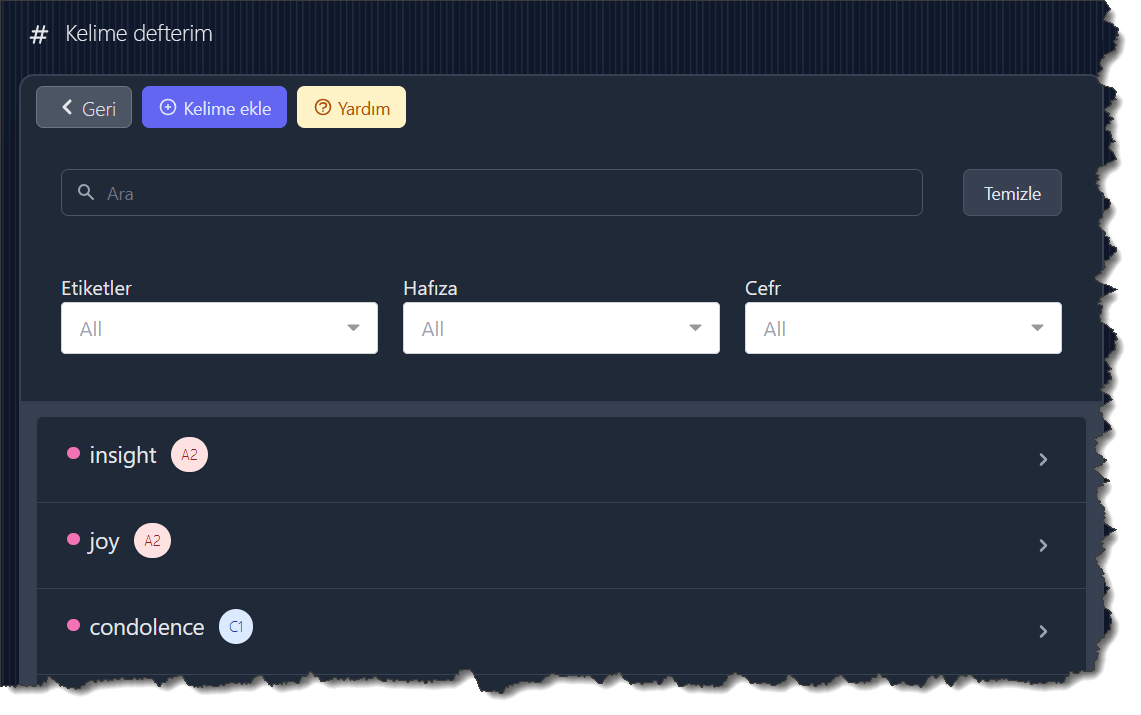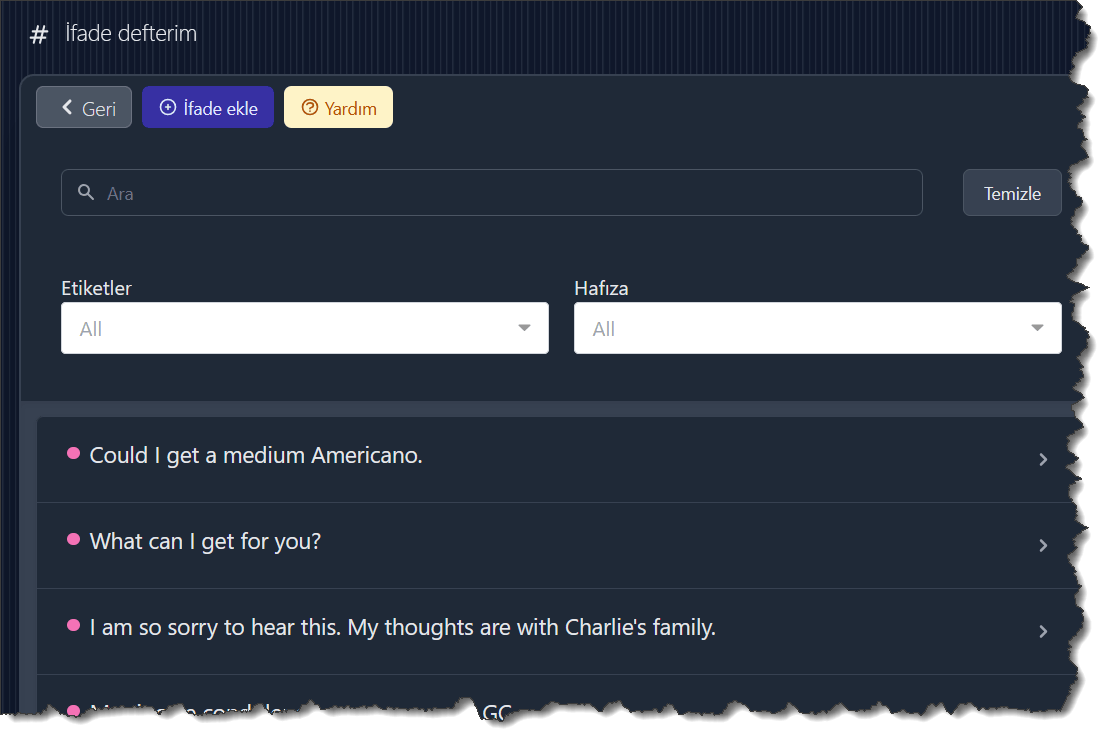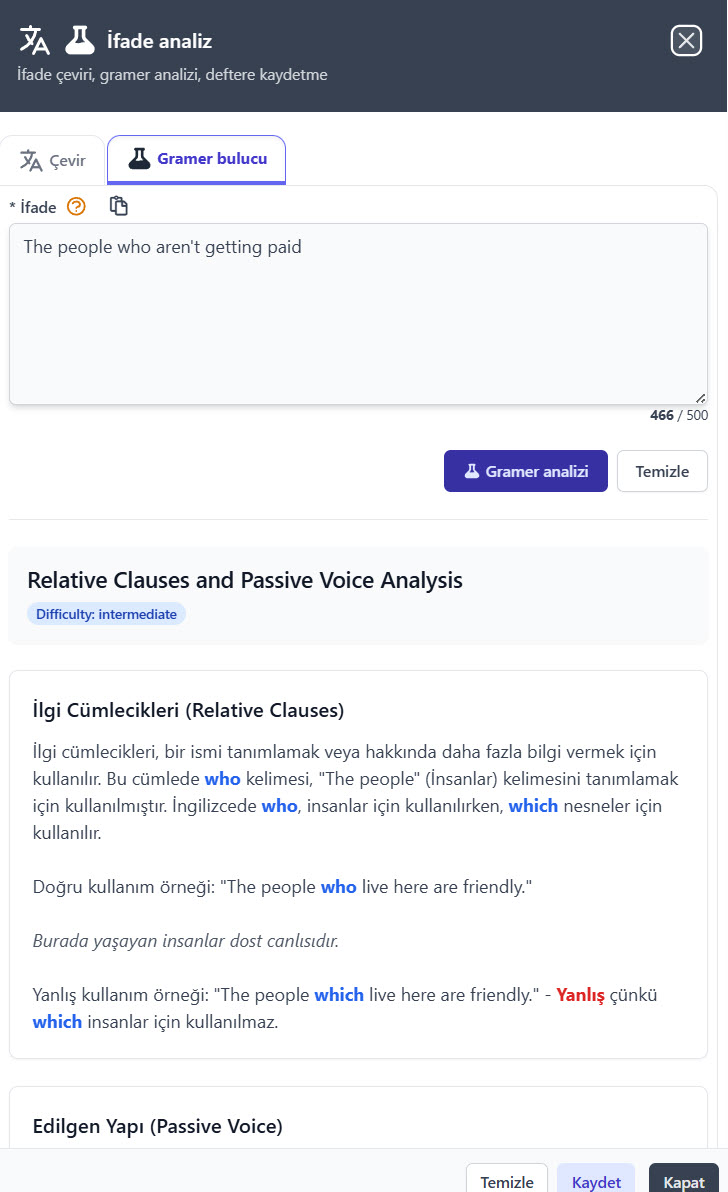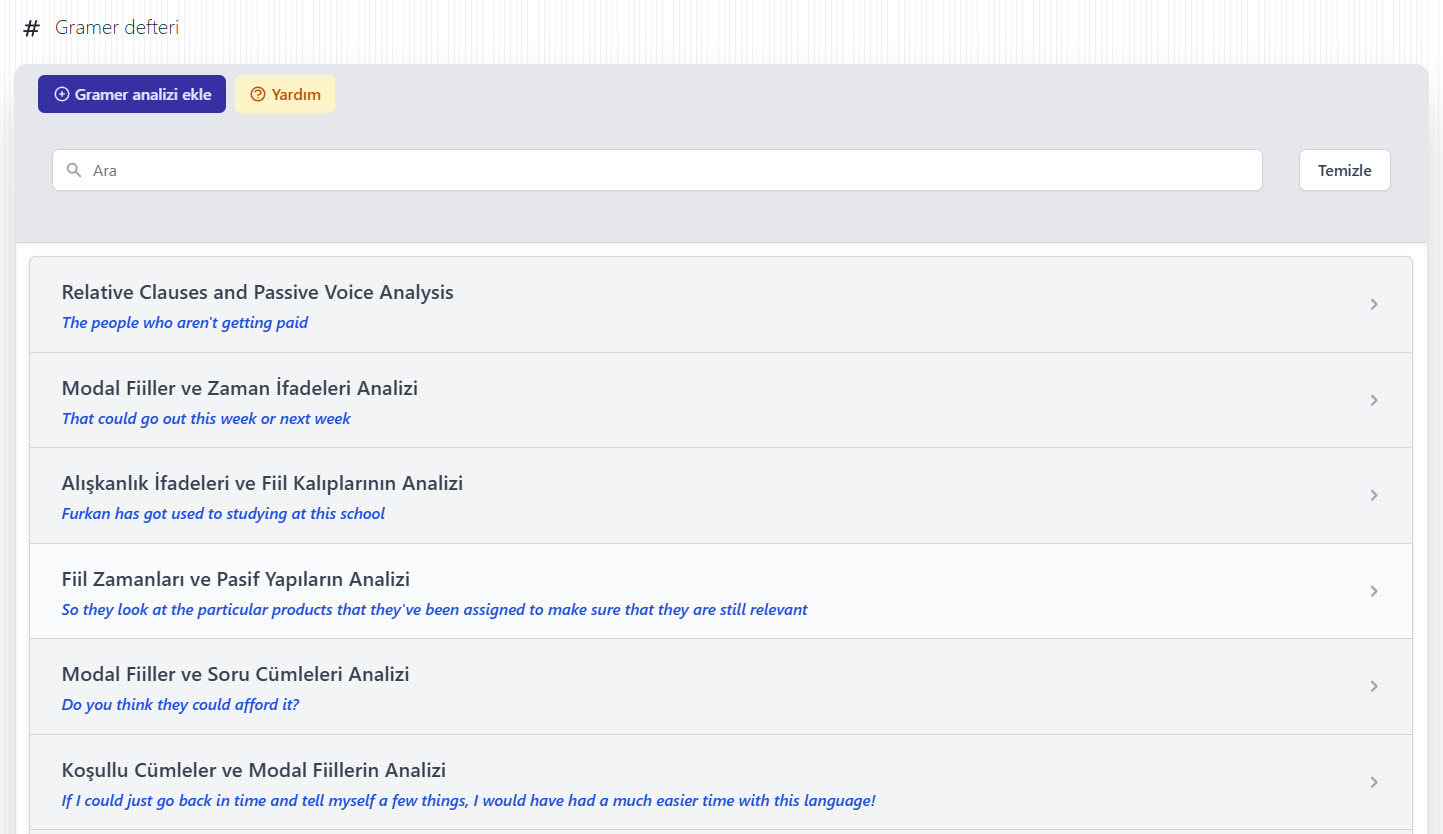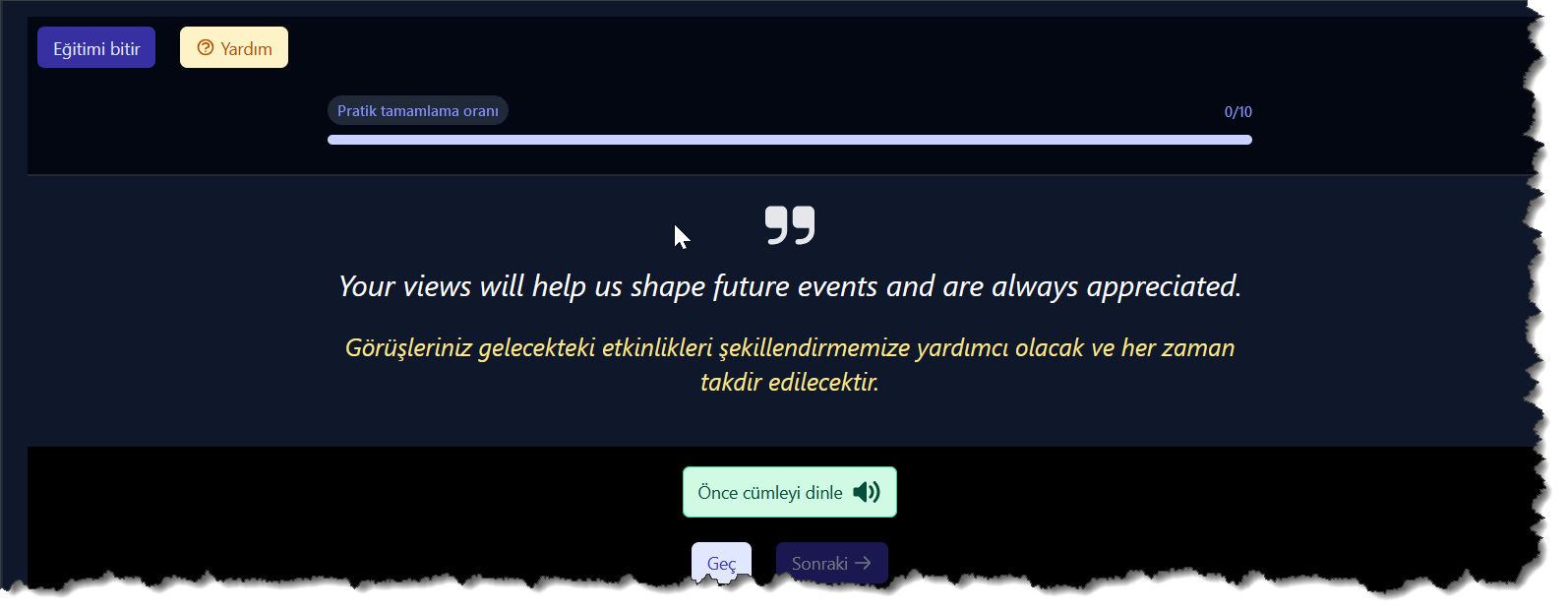
Dejavu English Portal
Documentation v2.0
Introduction
What is Dejavu English?
"Your Swiss Army Knife for English Learning"
We can be described as a next-generation vocabulary building portal that will radically change your English vocabulary learning experience.
The reason we define Dejavu English as a "portal" is that it brings together all the tools you need in your English language learning journey on a single platform. With the perfect harmony and integration between these tools, it provides you with the opportunity to rapidly develop your vocabulary.
5 Essential Features:
- Word, Phrase and Grammar Notebook:
You can save new words and phrases you encounter in everyday life to your digital notebooks within the platform. This way, you'll have everything you've learned stored in a secure place. All these saved entries, if they appear in English texts you read, will be highlighted in the text with memory color codes according to their memorization status. In short, it will give you a dejavu effect while reading the text.
- AI-powered Integrated Dictionary:
You add words to your notebook using the versatile dictionary within the platform. Dejavu dictionary is very different from traditional dictionaries. If you also write the sentence in which the word appears in the designated place in the dictionary, you'll learn the closest meaning of that word in the context of the sentence.
The Dejavu Dictionary doesn't stop at these features. If the word you're looking for matches a sentence you've previously saved in your phrase notebook, it will show you this sentence as well. Thus, you get the chance to see how the word you're looking for was used in a sentence you've previously saved. This way, you better grasp the word's real-life usage and make your learning process more effective.
- Automatic Tracking:
Every word you add from the Dejavu dictionary to your notebook is tracked according to the Spaced Repetition System (SRS) described in the Fluent Forever book. SRS targets the forgetting curve and resurfaces each item just before you’re likely to forget it with increasingly longer intervals.
Items you find easy are shown less frequently; difficult ones come back sooner. This moves words/phrases from short‑term memory into durable long‑term memory and replaces redundant review with reminders exactly when you need them. Dejavu English applies this technique for you and handles the tracking and timing automatically.
- Practice and Repetition:
Dejavu English’s practice screens are built on the Spaced Repetition System (SRS) recommended in the Fluent Forever book. Every word or phrase you add is scored by your performance and returns to your review queue at the most efficient intervals. Hard items appear sooner, easy ones later; intervals expand gradually based on success.
These SRS-based reviews leverage active recall and expanding intervals to strengthen learning, yielding long-term retention rather than short-lived cramming. Dejavu English prepares your daily practice according to this SRS schedule, surfacing the day’s ideal review set whenever you log in.
- AI-Powered Language Tools:
As its motto suggests, this portal is your Swiss Army knife for English learning. This is because all the tools you need in your English language learning journey are brought together on a single platform. There is perfect harmony and connection between all the tools. By using the Dejavu English portal, you will maximize your efficiency in language learning and developing your vocabulary.
Who is it designed for?
- Anyone enthusiastic about learning English and seeking effective tools for this journey.
- Those who want to note down and learn new words they encounter while reading books, articles, or any text.
- Those who want to practice using the words they've learned in sentences.
- Those seeking a personalized and interactive dictionary experience beyond traditional dictionaries.
- Those who want to continuously improve their English level and enrich their vocabulary.
- Those who want to reinforce the words they've learned through regular repetitions and embed them in their long-term memory.
How can I use it?
When using Dejavu English, you can follow a simple but effective workflow consisting of three main steps:
1. Discover and Save Words
Add new words you encounter while reading, watching, or listening to your digital notebook. Saving the word within a meaningful sentence helps you understand the context and remember it more easily.
2. Create Mnemonics (Memory Aids)
Creating a personal mnemonic for each word accelerates learning and makes it permanent. Dedicate a specific time each day to adding mnemonics to the words in your notebook.
This is where the magic begins: Use Google Images to find visuals related to the word. Combine these images with the word to create a scenario, a story in your mind. Associate the sound or spelling of the word with a funny situation or absurd connection in your native language. Then write down this scenario. The crazier and more fun it is, the better you'll remember it!
The images below show how the program helps you create mnemonics:
3. Reinforce with Spaced Repetition (Flashcard System)
After saving words to your notebook, regularly review them using flashcards. Dejavu English uses the Spaced Repetition System (SRS) principles described in the Fluent Forever book.
Front of the card: The word or sentence in the target language is shown. You try to recall the word.
Back of the card: You check the answer, see your mnemonic, translation, and other details. Then you rate how easy the word was (Hard, Normal, Easy).
Based on your response, the system decides when to show you that word again. Words marked as hard appear more frequently, while easy ones appear at longer intervals. This way, you use your time most efficiently and embed words into your long-term memory.
Daily Routine Suggestion
- Spend 10-15 minutes every day reviewing your cards.
- Add new words in small batches (5-10 words per day is ideal).
- Use your imagination when creating mnemonics and have fun.
- Try to use words in real life - by writing, speaking, or thinking.
Approaches Used
Dejavu English uses three fundamental approaches to improve your vocabulary in language learning:
1. Deductive approach
This method supports learning the word through its usage in a sentence and its context within that sentence.
It advocates learning idiomatic expressions as a whole in a language and using these expressions in your daily conversations. This way, you will both speak more fluently and be able to express your feelings much better to others. Over time, these idiomatic expressions will settle in your mind, allowing you to take your speaking or writing level to a higher level.
2. Approach of working with word/phrase pools created according to your own needs:
Another approach that Dejavu English advocates is to encourage you to save words and expressions you acquire by seeing, reading, or hearing from your environment into your digital notebook within the platform. This way, you will create your own word/phrase pools within the portal. Dejavu English doesn't dictate ready-made words to you like other language learning programs in the market - words and expressions that you may never use in your life. On the contrary, it helps you learn words and expressions that you save in your digital notebook and that have a memory for you.
Some scientific studies show that working with your personal word and phrase pool helps you learn these concepts faster and more effectively place them in your long-term memory.
3. Spaced Repetition System (SRS) and Active Recall
To make learning stick, Dejavu English applies the Spaced Repetition System and active recall techniques described in the Fluent Forever book. Difficult items appear more often, easier ones more sparsely; intervals extend gradually with success.
- Optimizes time: reminds you at the right moment instead of redundant review.
- Boosts motivation: offers small, finishable tasks every day.
- Long-term retention: moves knowledge from short-term to durable memory.
For more information: Fluent Forever (book). You can also see how SRS is applied inside Dejavu in the relevant sections of this page.
Language Tools Within the Portal
Text Analyzer/Word Hunter
Using this module while reading any English text or piece of writing will both aid your vocabulary learning and quickly give you an idea about which words you know at what level in the text. The Word Hunter can also be called a kind of intelligent text analyzer.
For example, when you copy any news article from BBC and paste it into this section and press Analyze, you'll be able to see which words you know at what level in the text with color codes. You can also quickly learn the meanings of underlined but uncolored words in the context of the sentence by clicking on them, thanks to the Dejavu Dictionary, and add them to your word notebook if you need.
Not only that, you can also learn how each word is used in which sentence in the text and save these sentences to your phrase notebook.
Far Superior to Its Counterparts
There are 3 important features that distinguish Dejavu English's text analyzer from others in the market. These are:
- The ability to capture all phrasal verbs in the text and learn their exact meanings in the context of the sentence from the Dejavu dictionary. For example, in the sentence I'll point him out to you next time he comes in, point him out will be underlined as a whole. (point and out will not be underlined separately) When you click on that underlined word group, Dejavu dictionary will show you the meaning of the phrasal verb "point out" in the context of the sentence.
- The clicked word will be searched in the Dejavu dictionary along with the sentence it's used in. Thus, the word will be considered in the context of the sentence and its closest meaning in your native language will be shown.
- Word groups such as as soon as possible, get used to, look forward, delve into will be underlined as a whole as they should be used and searched in the dictionary as such. This feature shows its difference from other text analysis programs in the market.
Sentence Fixer/Beautifier
Sometimes you wonder to what degree the sentences you form in your mind are correct. For this purpose, we developed the Sentence Fixer, a sentence beautifier and corrector tool. It analyzes and corrects the sentence you enter in 3 different options and provides information about why it corrected certain parts in your native language . The explanations for these 3 options will appear when you select them.
The difference between this tool and the Writing Training & Analysis tool is that it's faster and simpler. If you wish, you can transfer the sentence you entered in this tool to the Writing Training and Analysis section with a single click.
In the Writing Training and Analysis, the passage you enter is analyzed sentence by sentence, and errors in your sentences are shown one by one with their corrections written.
Writing Training and Analysis
Harnessing the power of artificial intelligence, it checks your writing attempts on any topic like an English language teacher, considering the following criteria:
- Whether you've made any spelling mistakes,
- Whether the words are used correctly in the sentence,
- Whether there are any awkward phrasings in your sentences,
- Whether you've used incorrect grammar,
- Whether you've paid attention to punctuation marks,
Then it shows you the corrections on the text and provides detailed comments. These are excellent features for those practicing English writing.
For example, assuming you're using British English in the portal, you'll see that in the sentence "Please make it take out" , it changes take out to takeaway . Because takeaway is used in British English.
Special Name/Street Name Pronunciation
For those learning English as a second language, pronouncing some personal names, proper nouns, or street and city names can be challenging.
On this page, you can learn how such words are pronounced in different English accents. For example, words like "San Juan", "Gemini", "Strathclyde" , and so on.
You can even learn how proper nouns in other languages are pronounced in those languages. For instance, if you're working at a company in France, you can learn here how to pronounce a French colleague's name in French.
Today's Newspaper
Dejavu English will compile morning and afternoon news for you every day according to your interests.
Our morning edition will be automatically available to you as you start your day, while the updated version will be accessible in the afternoon.
News collected from different sources will be adapted to B1+ English level . Thus, it will be ready to read in a way that supports your language learning.
Your Word Notebook
One of the most critical elements of language learning is storing the words you've learned in a safe place, reviewing them at regular intervals, and using them in daily life. Dejavu English makes this process easier and more fun for you.
Features:
- Storing and organizing words
- Smart reminder and practice system
- Adding notes and tags to words
- Ability to print (coming soon...)
- Word sharing with friends (coming soon...)
Dejavu English offers all these features automatically and in a user-friendly way. Thus, your word learning process becomes more efficient and enjoyable. With your personalized word notebook, you'll progress quickly in your language learning journey.
Additional information: Every word you save is tracked by Dejavu's sophisticated algorithm. This system creates a personalized repetition plan based on the learning status of the word. With regular reminders and practice exercises, it ensures that new words are embedded in your long-term memory. Thus, it works for you to learn each word thoroughly.
You can access all the words you saved from the Dejavu Dictionary here and list them with up to three filters at the same time.
For vocabulary learning we use the Fluent Forever SRS — the Spaced Repetition System. SRS is a method that helps lodge learned information into long‑term memory.

Core idea of SRS:
- The human brain forgets along a forgetting curve: we quickly forget what we’ve just learned.
- SRS reverses this by reviewing an item right before you’re about to forget it.
-
So the spacing between reviews increases over time:
First review → after a few minutes/hours
Second review → after 1 day
Third review → after 3–4 days
Later reviews → 1 week, 1 month, 3 months…
Based on this method, Dejavu English selects 5 or 10 words per day from your notebook (according to their SRS values) as mandatory tasks.
An item that isn’t finished today will stay on the list the next day as well. It remains a task until its practice is completed.
In the near future we will add a few more features to the word notebook:- Export your words in CSV, Excel, PDF format.
- Share selected words with others.
Your Phrase Notebook
In language learning, learning idiomatic expressions adds fluency and professionalism to your speech. Dejavu English believes that the 'deductive' method is one of the most effective methods in language learning and offers tools supporting this method. One of these tools is the 'Phrase Notebook'.
The Phrase Notebook is a powerful tool that you can use not only for language learning but also to improve your personal rhetoric skills. This feature helps you express yourself more effectively and naturally in the language you're learning.
With Dejavu English's Phrase Notebook:
- You can easily save and organize idiomatic expressions
- You can incorporate the expressions you've learned into your daily conversations
- You can improve your rhetorical skills
- Ability to print (coming soon...)
- Phrase sharing with friends (coming soon...)
Additional information: Every phrase you save is tracked by Dejavu's sophisticated algorithm. This system creates a personalized repetition plan based on the learning status of the phrase. With regular reminders and practice exercises, it ensures that new phrases are embedded in your long-term memory. Thus, it works for you to learn each phrase thoroughly.
Your Grammar Notebook
It identifies the grammar topics in the sentence you provide and explains them with examples in your native language. If you wish, you can save the sentence to your grammar notebook and review it again in the future, or use it as a reference.
Dictionary Usage
It's enough to write here the word you want to search in your word notebook or find in the Dejavu dictionary. Dejavu English contains a very advanced integrated dictionary supported by artificial intelligence. It provides you with information about the word you search for from many aspects.
Some of these include:
- The word's CEFR level (difficulty level)
- IPA information (international phonetic spelling)
- English explanations of the word
- Meanings of the word in your native language
- The word's frequency of use today
- Examples of the word's usage in sentences
- Many other useful pieces of information you won't find in traditional dictionaries...
Saving words to your word notebook:
If the word you find is already in your notebook, you'll see an Edit button. If not, save it by pressing the Save button. After you save it, the button will change to Edit. By clicking this button, you can add notes to the word in your notebook and associate tags you've created in the tag section.
The word you save to your notebook will immediately be tracked by Dejavu English and it will help you transfer it to your long-term memory by reminding you at certain periods (via email or WhatsApp message) and then making you practice.
Bilingual search feature
The integrated dictionary in Dejavu English has the ability to perform bilingual searches . Such as from English to your native language or from your native language to English.
When searching for a word in your native language, you should write it in its base form. For example, you should write "take a shower" instead of "took a shower" . This helps you get better results.
For an example of how the dictionary shows you the meaning in the context of the sentence, let's take the word "advanced". The advanced in the sentence "This computer has advanced features" and the advanced in the sentence "Japan is an advanced country" are expressed with different words in English. See how Dejavu English distinguishes this and shows it to you:
Rhetoric Tools
Improve your speaking and writing skills in English with rhetoric tools:
Before we move on to using these tools, let's understand what rhetoric is.
Rhetoric is the art of effective and persuasive speaking. This skill is used to express ideas powerfully, influence the listener, and convey your message effectively. Good rhetorical skills increase success in every area of life, from business to personal relationships.
Dejavu English offers powerful tools to help you improve your rhetorical skills, beyond just learning words. With features like the phrase notebook, writing exercises, and phrase practice, it opens doors to strengthening your rhetoric.
The phrase notebook allows you to save impressive sentences, powerful idioms, and persuasive expressions. Thanks to this feature:
- You can instantly save impressive expressions you read or hear.
- You can add your own notes to each expression, helping you remember the context of use.
- You can organize expressions by categories (e.g., business presentations, motivational speeches).
Phrase Practice: Perfect Your Rhetoric:
The phrase practice feature helps you actively use the expressions you've saved:- You can practice using saved expressions in different scenarios.
- The system encourages you to practice regularly and sends reminders.
- You can improve your pronunciation by making your own voice recordings. (coming soon...)
Support Us
Dejavu English is developed by a small but passionate team. Our team's most fundamental principle is to provide our users with a quality product and effectively solve their challenges in English language learning.
So far, we've continued our journey without any external investment, solely with the support and feedback of our users. This way, we continue to create a platform that makes a difference in language learning by focusing on the real needs of our users.
Contact Us
You can contact us about any topic through the Report an Issue page within the Dejavu portal. This is the fastest way to reach us. Alternatively, you can contact us by emailing info@dejavuenglish.com.
